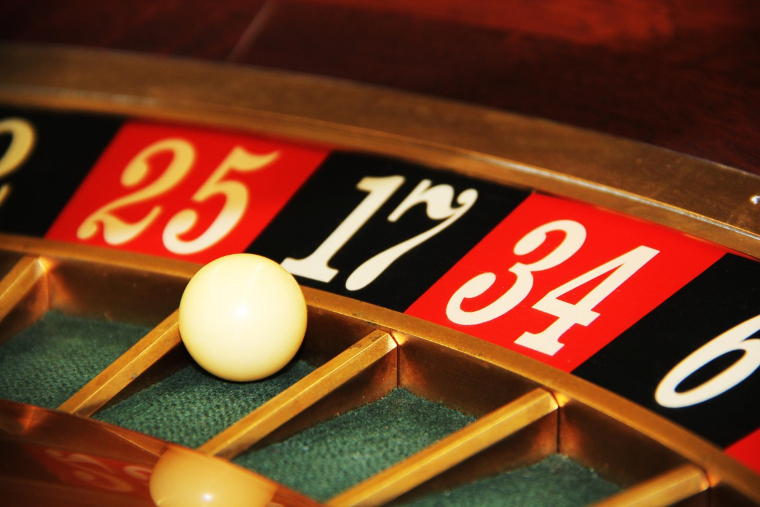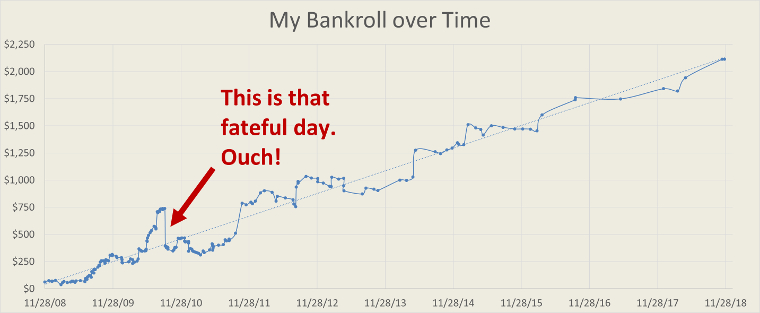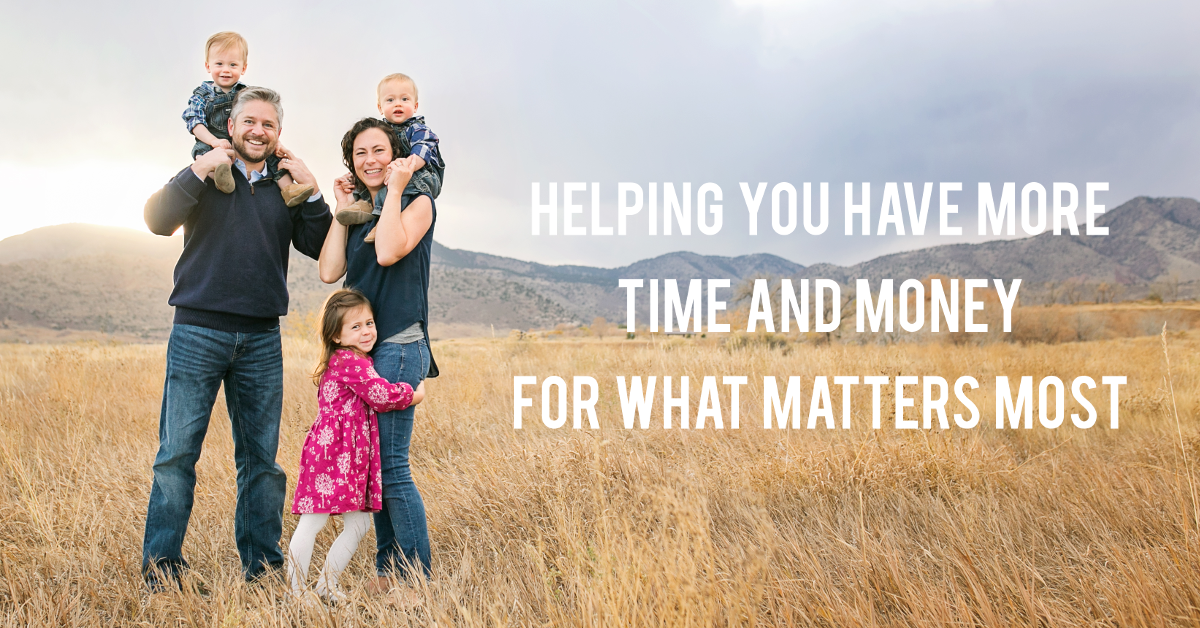You know those days that just seem to go from bad to worse? My worst day at the poker tables was just such a day.

Yeah, this is a roulette wheel, not a poker table. And that is precisely the problem….
In 88 games over nearly two years, I had been slowly adding to my winnings. But then came the 89th game….
This post tells the story of that day, together with a life-lesson it taught me.
In my first post in this series, I shared the first three life-lessons a decade of poker has taught me. Today I share Lessons 4 & 5, both of which have to do with emotional aspects of the game.
Life Lessons 4 & 5
4. Don’t Let Your Emotions Control You
If you think poker is all about math and sharp analysis, it’s not. Those are essential skills. But poker involves the emotions as much as the mind.
As a poignant example, take the day when I lost the most money I’ve ever lost playing poker.
The Day I Lost the Most Money at the Poker Tables
I had played a long session and had had the driest run of cards I have ever had to this day. In numerous hours of play, I did not once make a flush, straight, trips, or two-pairs. It was just dry, dry, dry.
Late into the night, I finally picked up not just a decent hand, but the best hand possible: pocket aces. I got all-in with an opponent preflop. He turned over two queens.
I knew the odds for a pair-over-pair matchup. I had about an 80% chance of winning. My opponent had about a 20% chance.
But when a queen came on the flop and he beat me, my reaction wasn’t the cool, calculated thought: “Well, I’ve probably won these types of matchups about 80% of the time. It’s only fair that I should lose them 20% of the time as well.”
No, I was mad. Instead of doubling up, my chips were gone. I had now lost $345—nearly half of the ~$700 bankroll I had gradually built over my first two years as a poker player. And I lost it in a single day! My blood—50% of which is Italian, mind you—was boiling.
Fortunately, I didn’t buy more chips—miracle #1. Rather, I stood up and headed for the exit.
On the way to the exit, however, the roulette wheel caught my eye. This was eight years ago, and I still remember it. It occurred to me, “I could put $345 on black to try to get back to even.”
Now, for me, that is a preposterous notion, one that my reason would never propose. But it wasn’t my reason speaking to me. It was my emotions.
The reason why playing roulette to get even is a preposterous notion for me—and I’m sure this will sound funny to some of you—is because I have no interest in gambling. That is, I have no interest in games of pure chance where, over time, the house ultimately wins. Hold’em is not such a game. It involves chance, for sure, but it’s ultimately a game of skill. For almost two years I had meticulously built my bankroll from $10 to a little over $700. Was I really going to put what remained of it at risk on the spin of a wheel?
I paused in front of the roulette wheel. It called to me like the sirens to Odysseus.
Just kidding; it wasn’t that bad. 🙂
But I did stand there, considering the proposition. My emotions were running high.
Fortunately, I didn’t listen to them—miracle #2. I exited the casino, preserved the bankroll I still had, and lived to fight another day.

Emotional Struggles Today
Over time, I’ve grown to where I’m usually not frazzled when I lose a hand that I’m a favorite to win. As long as I’ve played the hand well, I can live with the inevitable bad beats.
But that doesn’t mean I’ve mastered my emotions at the poker table. It’s hard to be impervious to the taunts of a player trying to get under my skin. Even harder, for me, is not beating myself up over a hand that I play poorly.
In a day and age when most every song/movie/etc. makes it seem like decisions should be based solely on how we feel, it’s worth noting that emotions are often bad guides.
When someone cuts you off in traffic, is cussing or a drag race helpful? Is that really who you are?
When the stock market dips, should you pull your money out? If you have a well-thought-out investment strategy, you should avoid such knee-jerk reactions.
If someone excites you, is that reason enough to marry that person? Excitement is great. But it won’t carry you through the tough times; emotions wax and wane.
Emotions are an important part of life. We wouldn’t be fully human without them. But you can’t let them control you.
5. Fear Not
This point is sort of a subset of the previous one. But it’s worth its own lesson on account of how common it is.
I can’t tell you how many times I’ve feared facing unknown poker players. But my fear has never been justified.
In many cases, the player I feared just didn’t turn out to be that good.
But even when the player turned out to be quite good—even great—there was never reason to fear, per se. Sure, they play well. But that doesn’t mean I can’t, too. Yes, they often finish in the money. But that doesn’t mean I can’t as well.
From the perspective of making money, fearing a good player is unnecessary. But from a higher perspective, it is not only unnecessary: it’s nonsensical. After all, it is precisely the competition of good players that makes the game fun and makes winning satisfying.
The instruction “fear not” is given at least 80 times in the Bible. We are so susceptible to fear, and yet it is so often unjustified.
Just think back on times you feared something: a big decision, a presentation, a deadline, etc. Looking back, how often was that fear warranted? Very rarely, I suspect. That’s worth keeping in mind the next time you’re afraid.
Conclusion
The three life-lessons from my previous post involved being patient, acting when the moment is right, and persevering through difficulty.
The day I lost the most money at the poker tables taught me the fourth life-lesson: don’t let your emotions control you.
And the fifth life-lesson is a subset of the fourth. One way in which we are so often controlled by our emotions is when we are afraid. Recognizing how unwarranted fear so often is, we must “fear not.”
In my final post in this series, I will share Life Lessons 6-8, including the single biggest lesson 10 years of poker have taught me.
Question: Emotions are powerful. How do you prevent them from controlling you? You can leave a comment by clicking here.
If you liked this post, why not join the 5,000+ subscribers who receive blog updates on how to have more time and money for what matters most? Sign up here.
